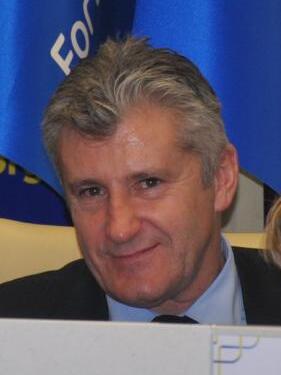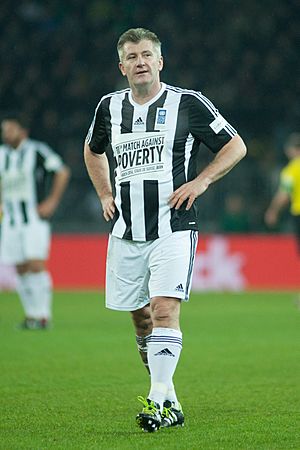Davor Šuker facts for kids
Quick facts for kids
Davor Šuker
|
|||||||||||||||||||||||||||||||||||||||||||||||||||||||||||||||||||||||||||||||||||||||||||||||||||||||||||||||||
|---|---|---|---|---|---|---|---|---|---|---|---|---|---|---|---|---|---|---|---|---|---|---|---|---|---|---|---|---|---|---|---|---|---|---|---|---|---|---|---|---|---|---|---|---|---|---|---|---|---|---|---|---|---|---|---|---|---|---|---|---|---|---|---|---|---|---|---|---|---|---|---|---|---|---|---|---|---|---|---|---|---|---|---|---|---|---|---|---|---|---|---|---|---|---|---|---|---|---|---|---|---|---|---|---|---|---|---|---|---|---|---|---|---|

Šuker in 2016
|
|||||||||||||||||||||||||||||||||||||||||||||||||||||||||||||||||||||||||||||||||||||||||||||||||||||||||||||||||
| President of the Croatian Football Federation | |||||||||||||||||||||||||||||||||||||||||||||||||||||||||||||||||||||||||||||||||||||||||||||||||||||||||||||||||
| In office 5 July 2012 – 29 July 2021 |
|||||||||||||||||||||||||||||||||||||||||||||||||||||||||||||||||||||||||||||||||||||||||||||||||||||||||||||||||
| Preceded by | Vlatko Marković | ||||||||||||||||||||||||||||||||||||||||||||||||||||||||||||||||||||||||||||||||||||||||||||||||||||||||||||||||
| Succeeded by | Marijan Kustić | ||||||||||||||||||||||||||||||||||||||||||||||||||||||||||||||||||||||||||||||||||||||||||||||||||||||||||||||||
| Personal details | |||||||||||||||||||||||||||||||||||||||||||||||||||||||||||||||||||||||||||||||||||||||||||||||||||||||||||||||||
| Born | 1 January 1968 Osijek, SR Croatia, Yugoslavia |
||||||||||||||||||||||||||||||||||||||||||||||||||||||||||||||||||||||||||||||||||||||||||||||||||||||||||||||||
| Height | 1.83 m (6 ft 0 in) | ||||||||||||||||||||||||||||||||||||||||||||||||||||||||||||||||||||||||||||||||||||||||||||||||||||||||||||||||
| Parent |
|
||||||||||||||||||||||||||||||||||||||||||||||||||||||||||||||||||||||||||||||||||||||||||||||||||||||||||||||||
| Occupation | Footballer Football administrator |
||||||||||||||||||||||||||||||||||||||||||||||||||||||||||||||||||||||||||||||||||||||||||||||||||||||||||||||||
|
Association football career
|
|||||||||||||||||||||||||||||||||||||||||||||||||||||||||||||||||||||||||||||||||||||||||||||||||||||||||||||||||
Davor Šuker (born 1 January 1968) is a famous Croatian football player who used to be a striker. He is known as one of the greatest Croatian players ever. He was also the president of the Croatian Football Federation from 2012 to 2021. Šuker is still Croatia's top goal scorer with 45 goals!
Šuker started playing football at age 16 for his hometown team, NK Osijek. He became the top scorer in the league during his last season there. In 1989, he moved to Dinamo Zagreb. After the Croatian War of Independence, Šuker moved to the Spanish club Sevilla in 1991. He played very well in La Liga, scoring many goals.
Five years later, he joined Real Madrid, where he continued to be a top scorer. With Real Madrid, he helped the team win the La Liga title and the UEFA Champions League. Later, he played for Arsenal and helped them reach the 2000 UEFA Cup Final. He also played for West Ham United and finished his career with the German team 1860 Munich.
One of the most amazing parts of Šuker's career was the 1998 FIFA World Cup in France. He won the World Cup Golden Boot by scoring six goals in seven matches. He also won the Silver Ball as the second-best player in the tournament. His goals helped Croatia win the bronze medal in their very first World Cup! Croatia did not lose any match where Šuker scored, until their semi-final loss to France. Šuker was named Croatia's Golden Player in 2003. He was also ranked third in the 1998 FIFA World Player of the Year award and second in the 1998 Ballon d'Or. He is the only Croatian player on the FIFA 100 list, which was created by the legendary player Pelé.
Under his leadership as president of the Croatian Football Federation, Croatia reached the final of the 2018 FIFA World Cup. This was the country's best achievement since their third-place finish in 1998.
Contents
Club Career Highlights
Starting His Journey
Davor Šuker was born in Osijek. He began his football career in 1984 with his local club, NK Osijek. In 1989, he moved to Dinamo Zagreb. During his two seasons there, he scored 34 goals in 60 matches. His great performance led to him being called up for the Yugoslavia national team. Many clubs noticed him, and he joined the Spanish club Sevilla in 1991.
Shining in Spain with Sevilla
Šuker played his first game for Sevilla in Spain's top league, La Liga, on 17 November 1991. In his next match, he scored two goals in a 2–2 draw. He ended his first season with 6 goals in 22 games. The next season, he scored his first hat-trick (three goals in one game) for Sevilla, helping them win 4–3. He scored 13 goals in 33 matches that season.
In the 1993–94 season, Šuker was the second-highest scorer in the league with 24 goals. He played 34 games and scored five times two goals in a match, plus another hat-trick. He even played alongside the famous Argentine legend Diego Maradona during the 1992–93 season. Over two seasons with Sevilla, he scored 33 goals in 64 games.
Winning Big with Real Madrid
Before the 1996–97 season, Šuker moved to Real Madrid. He continued to score many goals, with 24 goals in 38 games. He was the third-best scorer in the league that season. He scored three hat-tricks and helped Madrid win the league title. With Raúl and Predrag Mijatović, he formed a very strong attacking team.
Šuker also helped Real Madrid win the 1997–98 UEFA Champions League the next season. He scored 10 goals in 29 league games. In the 1998–99 season, he played less often, scoring 4 goals in 19 games. After eight seasons in Spain, where he scored 114 goals in 239 games, he decided to leave.
Playing in England
Šuker joined the English club Arsenal for the 1999–2000 season. He made his debut on 22 August 1999. In his first start, he scored two goals. With Arsenal, he played in the 2000 UEFA Cup Final. Arsenal lost the final on penalties, and Šuker missed his penalty kick. He scored 8 league goals in 22 games for Arsenal.
After Arsenal, Šuker played for West Ham United. He found it hard to get a regular spot in the team and only played 11 league games, scoring two goals. His time in England ended after that season.
Finishing His Career in Germany
In the 2001–02 season, Šuker moved to the German club 1860 Munich. He played his first game in the Bundesliga on 1 December 2001. He scored his first goal for the club in a 3–0 win. He finished his first season with 4 goals in 14 games. In the 2002–03 season, he scored 1 goal in 11 games. He retired from club football after this season.
International Football Career
Youth Team Success
Šuker was a fantastic goal scorer even when he was young. He scored six goals at the 1987 FIFA World Youth Championship in Chile, making him the second-highest scorer. His team, Yugoslavia, won the championship with many future stars like Robert Prosinečki and Zvonimir Boban.
Šuker also played for Yugoslavia in the 1988 Seoul Summer Olympic games. He then played in the 1990 UEFA European Under-21 Championship. He scored seven goals in this tournament, winning the Golden Boot. Yugoslavia finished as runners-up, and Šuker was named the Golden Player of the Tournament.
Playing for Croatia
In 1990, Šuker was part of the Yugoslavia national team for the 1990 FIFA World Cup in Italy, but he did not play.
On 22 December 1990, Šuker played his first game for the new Croatia national team. He also played two games for Yugoslavia in 1991, scoring his first international goal.
Šuker's second official match for Croatia was in 1992, where he scored two goals in a 3–0 win against Mexico. He then helped Croatia qualify for their first big international tournament, UEFA Euro 1996, by scoring a record 12 goals in 10 qualifying matches. In the Euro 1996 tournament in England, he scored three goals in four games. This included two goals in a 3–0 win against Denmark, where he scored a memorable looping shot over the goalkeeper. Šuker was named to the Team of the Tournament.
Šuker then led Croatia to their first FIFA World Cup in 1998, scoring five goals in the qualifying rounds. In the tournament in France, he scored six goals in seven matches, scoring in every game Croatia scored in. This included goals in 1–0 wins against Japan and Romania. In the quarter-finals against Germany, Šuker scored the final goal in a 3–0 victory. He also scored the first goal in the semi-final against France, but France won 2–1.
In the match for third place, Šuker scored the winning goal in a 2–1 victory against the Netherlands. This led Croatia to an amazing third-place finish in their first World Cup as an independent nation. Šuker won the World Cup Golden Boot as the tournament's top scorer and the Silver Ball as the second-best player.
After the 1998 World Cup, Šuker played for Croatia in their attempt to qualify for UEFA Euro 2000. He scored a winning goal in the 94th minute against the Republic of Ireland, keeping Croatia's hopes alive. He scored four goals in seven matches during that campaign.
Šuker was also part of the Croatian team at the 2002 FIFA World Cup in South Korea and Japan. He played only 63 minutes in one match. After Croatia was eliminated, Šuker announced his retirement from international football.
Šuker played a total of 70 international games, scoring 46 goals. With 45 goals, he is Croatia's all-time leading goal scorer. His record of 12 goals in the Euro 1996 qualifiers stood for over 10 years.
Life After Playing Football
After retiring from playing, Davor Šuker started his own football school called the Davor Šuker Soccer Academy. This academy has training camps in Zagreb and other Croatian cities, helping young players learn and grow.
Honours and Awards
Real Madrid
- La Liga: 1996–97
- Supercopa de España: 1997
- UEFA Champions League: 1997–98
- Intercontinental Cup: 1998
Arsenal
- UEFA Cup runner-up: 1999–2000
Yugoslavia
- FIFA U-20 World Cup: 1987 (Winner)
- UEFA European Under-21 Championship runner-up: 1990
Croatia
- FIFA World Cup third place: 1998
Individual Awards
- 1998 FIFA World Cup: Golden Boot (Top Scorer)
- 1998 FIFA World Cup: Silver Ball (Second Best Player)
- 1998 FIFA World Cup: All-Star Team
- Ballon d'Or runner-up: 1998
- FIFA World Player of the Year Bronze Award: 1998
- 1987 FIFA U-20 World Cup: Silver Shoe
- Yugoslav First League Top Goal Scorer: 1988-89
- UEFA European Under-21 Championship 1990: Golden Player
- UEFA European Under-21 Championship 1990: Golden Boot
- UEFA Euro Team of the Tournament: 1996
- ESM Team of the Year: 1996–97
- Croatian Footballer of the Year: 1992, 1994, 1995, 1996, 1997, 1998
- Franjo Bučar State Award for Sport: 1998
- Croatian Sportsman of the year: 1998
- World Soccer 100 Greatest Players of the 20th Century: 1999
- UEFA Jubilee Awards Croatia's Golden Player: 2004
- FIFA 100: 2004
- Honoree of Osijek: 2008
- Vecernji list Croatian Player of the Century
- All-time top scorer of the Croatia national team
Orders
 Order of Danica Hrvatska with face of Franjo Bučar: 1995
Order of Danica Hrvatska with face of Franjo Bučar: 1995 Order of the Croatian Trefoil: 1998
Order of the Croatian Trefoil: 1998- Order of Duke Trpimir with Ribbon and Star: 2018
See also
 In Spanish: Davor Šuker para niños
In Spanish: Davor Šuker para niños
- List of top international men's football goalscorers by country
 | Laphonza Butler |
 | Daisy Bates |
 | Elizabeth Piper Ensley |


